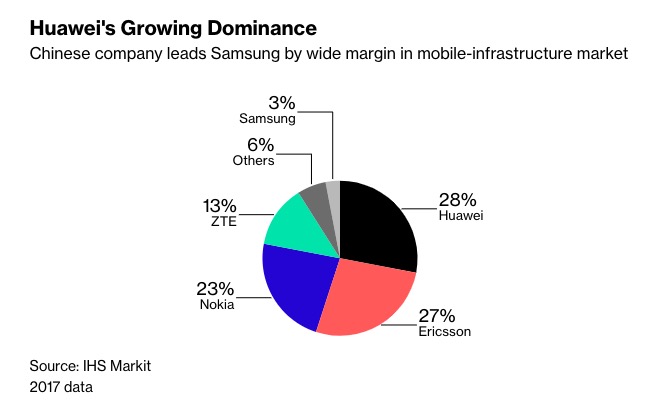While Samsung Electronics Co. has become synonymous with technology in South Korea, a controversial rival could upstage it in the race to build fifth-generation wireless networks in its own backyard.
Huawei Technologies Co., the Chinese company slammed in the U.S. Congress as a security threat, is in the running to supply equipment to all three of South Korea’s national mobile carriers. At stake: initial contracts that could be worth 10 trillion won ($9 billion).
As South Korea pushes to become the first nation to roll out 5G networks, suppliers from around the world are vying to sell switches, base stations and other gear needed to make them work. While Samsung is best known for its smartphones and memory chips, having its equipment shut out of the most advanced wireless networks in its homeland would be a setback for a company that has suffered a number of recent black-eyes.
Huawei has grown to become the largest network gear maker and is pushing deep into 5G technology, investing heavily in research and becoming one of the biggest holders of patents. Its prospects came into focus earlier this year when President Donald Trump blocked Broadcom Inc. from buying Qualcomm Inc. as the U.S. cited risks that the deal could help the Chinese company take the lead in developing next-generation networks.
“Huawei has been aggressive and started development earlier than others,” Park Jin-hyo, executive vice president of SK Telecom Co., said in an interview. “We are looking with an open stance and no bias whatsoever.”
While aware of security concerns surrounding Huawei, Park said South Korea’s largest carrier is looking at other factors including technology and costs, adding the firm wouldn’t be considering the Shenzhen-based company if it fell short of global security standards.
SK Telecom and smaller rivals KT Corp. and LG Uplus Corp. have more than 56 million subscribers, a number greater than the country’s population of just 51 million. Cost is a critical factor in deciding their equipment needs after they agreed last month to fork out 3.6 trillion won for 5G wireless spectrum.
LG Uplus has expressed willingness to choose Huawei while SK Telecom and KT are weighing the Chinese company as well as Samsung, Nokia Oyj and Ericsson AB. This week, the country’s technology minister is scheduled to meet with the heads of Korea’s three wireless carriers to go over their 5G rollout blueprint -- a confab at which Huawei will almost certainly come up.
The appeal of 5G technology comes down to its ability to transmit data fast enough to aid the operation of self-driving cars or download feature-length movies in seconds.

While Samsung has never had a huge share of the global market for wireless network gear, it has always been able to rely on hometown support. In Huawei, it faces a competitor that can undercut it on price but also seeks to emulate its reputation for customer service.
“Huawei’s appeal is its price competitiveness,” said Kim Hyun-yong, an analyst at Ebest Investment & Securities Co. “And it has a lead with its 5G devices developed well enough to be put to work immediately.”
Still, questions remain about Huawei and security. The company was founded in 1987 by a former Chinese military officer and it says it’s now owned by workers. But the U.S. has accused it of maintaining close links to the government and enabling spying by the mainland. It’s effectively been blocked from selling network equipment to the biggest U.S. carriers and struggled to get support for its mobiles in the country.
Security allegations resonate in South Korea, which is a U.S. ally hosting almost 30,000 American troops but at the same time needs China’s support to remove nuclear arms in North Korea. Petitions have appeared on the South Korean presidential website seeking to ban Huawei from the country, which after becoming the first major market to reach full 4G coverage wants to extend that to 5G.
Huawei didn’t respond to an emailed request for comment. Samsung declined to comment.
Huawei’s success in winning network contracts has seen it push heavily into consumer devices and it’s now the third-largest smartphone vendor, behind only Samsung and Apple Inc. While Samsung still enjoys a lead over Huawei in smartphones, that edge is shrinking. The maker of Galaxy phones had a 21.9 percent share while Huawei had 10.8 percent last year, according to TrendForce.
5G is important to Samsung, which seeks to boost its profile as a supplier of networking equipment by doing well in countries tapping the next-generation spectrum early, such as South Korea and Japan.
Samsung is already being challenged in its components businesses as Chinese rivals seek to catch up in televisions and memory chips, two sectors where the Suwon-based company is the world’s biggest.
“Supplying 5G equipment in a country that’s going to be the world’s first to go 5G has enormous symbolism to it,” said Hong Een-kee, a professor of wireless communications at Seoul’s Kyung Hee University. “Huawei stays competitive globally because it has a solid grip at home. Imagine what it’d mean if a South Korean company lost in its own backyard when it’s trying to raise its own share of the global market.” |